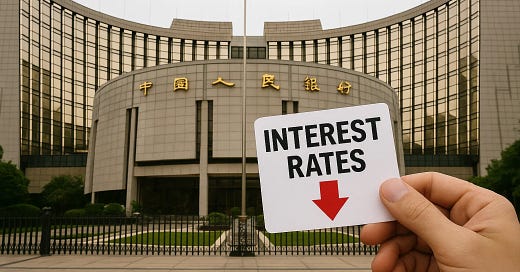Growth Dragons Weekly: China Cuts Rates, Biotech Booms, Xiaomi’s 3nm Chip, Alibaba’s Meitu Deal, and Tongshifu’s Pop Mart-Style IPO
What happened in China this week:
PBOC Cuts Interest Rates; Banks Slash Fixed Deposit Rates Below 1%
China Biotech Stocks Rally Over 200%, Partner With Merck and Pfizer
Xiaomi Launches In-House 3nm Chip: XRing O1 Powers Phones, Tablets, and EVs
Alibaba Buys Meitu Convertible Bonds, Following Microsoft’s Playbook to Lock In Cloud Customers
Tongshifu’s IPO Is a Blend of Pop Mart and Laopu Gold—A Bet on China’s Cultural Consumer Boom
#1 PBOC Cuts Interest Rates; Banks Slash Fixed Deposit Rates Below 1%
On May 20, 2025, the People’s Bank of China (PBOC) cut interest rates once again—lowering the one-year Loan Prime Rate (LPR) from 3.1% to 3.0%, and the five-year LPR, commonly used to price mortgages, from 3.6% to 3.5%.
At the same time, China’s major banks—including the six state-owned lenders and China Merchants Bank (CMB)—reduced their one-year fixed deposit rates to below 1%. This marks the seventh rate cut since 2022, officially ushering in the sub-1% deposit era. Smaller banks followed suit, though their cuts were less aggressive.
These policy moves have triggered notable shifts in consumer behavior. According to the South China Morning Post citing CMB:
40% of CMB clients have shifted funds to smaller banks offering better rates.
40% turned to savings insurance.
20% opted for short-term wealth management products.
The total value of bank wealth management products surged to ¥31 trillion in April, largely driven by the widening yield gap with traditional deposits.
Despite these numbers, consumer sentiment remains cautious. Nonetheless, these rate cuts are promising initial steps that could catalyze broader financial reforms. But we believe that sparking real consumption will require more than just lower rates—it also demands dismantling the remaining incentives that encourage hoarding cash in deposits.
As interest margins continue to shrink, Chinese banks have relied on creative strategies to retain customer deposits. Institutions like China Merchants Bank and Bank of Beijing have rolled out deposit-linked welfare campaigns—offering tangible rewards like consumer goods tied to fixed-term deposits. These efforts shifted competition from purely interest-based to value-added engagement, and they’ve been highly effective in keeping deposits in place.
But such welfare schemes are likely unsustainable. With thinner margins and mounting pressure, we expect these incentives to be phased out. This shift could push more consumers toward investing. While that may strain some banks’ liquidity, the PBOC’s earlier reserve requirement ratio (RRR) cuts and its continued liquidity support should provide sufficient cushion.
China's loose monetary policies, combined with a recovering stock market, have also improved foreign investor sentiment:
UBS Outlook:
UBS expects foreign capital inflows into China to increase in the coming quarters.
1 in 5 global family offices plan to raise their exposure to China over the next 12 months.
Morgan Stanley Forecast:
MSCI China 12-month target raised to 78 (a 5% upside).
CSI 300 index target raised to 4,000 (a 3% upside).
Institutional Commitment:
JPMorgan CEO Jamie Dimon reaffirmed the bank’s long-term investment commitment to China.
CapitaLand Investment (CLI) launched its first onshore master fund worth ¥5 billion, targeting domestic investors.
By easing monetary conditions and encouraging banks to pivot from interest-based retention strategies, China is laying the groundwork for a more resilient and dynamic economy. Backed by rising international confidence and structural reforms, these efforts could help China address near-term headwinds while positioning for sustainable long-term growth.




